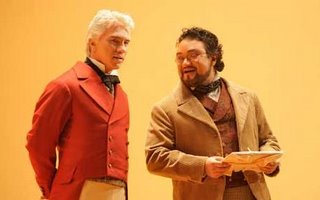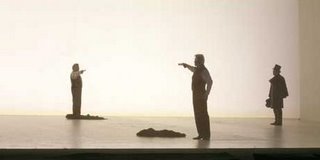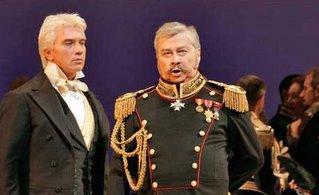Eugene Onegin Outshines his Colleagues at the MET
 On paper, the Metropolitan Opera’s Eugene Onegin offered one of the strongest casts imaginable these days for Tchaikovsky’s most beloved opera. With Renée Fleming and Dmitri Hvorostovsky as Tatiana and Onegin, Ramón Vargas as Lenski, veteran Russian bass Sergei Aleksahkin as Prince Gremin, Elena Zaremba as Olga and our Russian conductor of choice, Valery Gergiev, in the pit this was, as the New York Times had stated, the highlight of the season. All performances have sold out so far – and the remaining ones (today, February 24th, 28th, and March 3rd) will, too.
On paper, the Metropolitan Opera’s Eugene Onegin offered one of the strongest casts imaginable these days for Tchaikovsky’s most beloved opera. With Renée Fleming and Dmitri Hvorostovsky as Tatiana and Onegin, Ramón Vargas as Lenski, veteran Russian bass Sergei Aleksahkin as Prince Gremin, Elena Zaremba as Olga and our Russian conductor of choice, Valery Gergiev, in the pit this was, as the New York Times had stated, the highlight of the season. All performances have sold out so far – and the remaining ones (today, February 24th, 28th, and March 3rd) will, too.
Perhaps the accordingly high expectations made for a slight disappointment – and a disappointment difficult to categorize. Much delights in this production, the singing is uniformly good or better, the staging and direction appealing and a most welcome break from the cluttered traditionalist settings Eugene Onegin endures so often, the acting very fine. Alas, last week it did not come quite together as it should. Perhaps the only noticeable flaw was the reason: The orchestra under Maestro Gergiev played dispassionate and shockingly sloppy – rushed from highlight to highlight but leaving no memorable tune quite as memorable as it should have been. Instead of ‘raw’ as in ‘exciting’, their playing and direction was raw as in ‘crass’, ‘unloving’, with insecure brass thrown in on more occasions than I care to remember. One nice swell, one forceful romp per scene dost a captivating orchestral contribution not make.
 I thought I’d never think or utter the following: I wish Tchaikovsky had been played more romantically. Such a beautifully lush opera Eugen Onegin is, and its romanticism arguably more tastefully employed than in other Tchaikovsky works, there was a distinct yearning for what James Levine would or could have done here. I reckon that his approach would have had further merit by giving Renée Fleming the kind of accompaniment she deserves. Her voice may not be an ideal type for the character of young Tatiana, but it is nigh ideal for the music. In her first Russian role at the MET, she made the best of it and supported it with great acting - again cementing the fact that she is best when busy on stage, rather than when self-conscious in the recording studio. Her Tatiana was warm, suffering, unmannered, and harrowing. Although the letter-scene might offer the finest music, it was in the third act that her character, now matured, completely merged with Ms. Fleming for a cohesive, pleasantly un-spectacularly beautiful performance.
I thought I’d never think or utter the following: I wish Tchaikovsky had been played more romantically. Such a beautifully lush opera Eugen Onegin is, and its romanticism arguably more tastefully employed than in other Tchaikovsky works, there was a distinct yearning for what James Levine would or could have done here. I reckon that his approach would have had further merit by giving Renée Fleming the kind of accompaniment she deserves. Her voice may not be an ideal type for the character of young Tatiana, but it is nigh ideal for the music. In her first Russian role at the MET, she made the best of it and supported it with great acting - again cementing the fact that she is best when busy on stage, rather than when self-conscious in the recording studio. Her Tatiana was warm, suffering, unmannered, and harrowing. Although the letter-scene might offer the finest music, it was in the third act that her character, now matured, completely merged with Ms. Fleming for a cohesive, pleasantly un-spectacularly beautiful performance.
 If Ramón Vargas sounded nasal, slightly strained and underpowered for much of the February 13th performance, he made up for it in his long, searing monologue (“Kada, kada” et al.) just before he allows himself to be shot by Onegin. Elena Zaremba, who I have admired since first hearing her Carmen in Munich, but scared me during Washington’s Rheingold where he voice seemed to be an eerie ghost of the past (purposefully, for Erda?), displayed a tone that sounded healthy, burnished, dark. Not exactly the epitome of the care-free Olga, but good to hear, all the same. Svetlana Vokova, as Madame Larina, grew on the ears during the first act. Homey, not too refined, it was befitting her role as the mother. Larisa Shevchenko as Tatiana’s nurse started effortful and was covered by orchestral swells before finding her stride in Scene two of Act one.
If Ramón Vargas sounded nasal, slightly strained and underpowered for much of the February 13th performance, he made up for it in his long, searing monologue (“Kada, kada” et al.) just before he allows himself to be shot by Onegin. Elena Zaremba, who I have admired since first hearing her Carmen in Munich, but scared me during Washington’s Rheingold where he voice seemed to be an eerie ghost of the past (purposefully, for Erda?), displayed a tone that sounded healthy, burnished, dark. Not exactly the epitome of the care-free Olga, but good to hear, all the same. Svetlana Vokova, as Madame Larina, grew on the ears during the first act. Homey, not too refined, it was befitting her role as the mother. Larisa Shevchenko as Tatiana’s nurse started effortful and was covered by orchestral swells before finding her stride in Scene two of Act one.
 The staging (production by Robert Carsen, set and costume designer Michael Levine, stage director Peter McClintock), an oddly enchanting mix of conservatism and minimalism, was a treat for the eyes and left the focus where it should ideally be – on the acting. Playing with soft and hard shadows (especially in the shadow-cut-like Duel scene), vibrant colors (superb lighting by Jean Kalman), and diligent use of props, it appealed at every instance even if the over-all effect was not able to keep the excitement that these instances of inspiration provided.
The staging (production by Robert Carsen, set and costume designer Michael Levine, stage director Peter McClintock), an oddly enchanting mix of conservatism and minimalism, was a treat for the eyes and left the focus where it should ideally be – on the acting. Playing with soft and hard shadows (especially in the shadow-cut-like Duel scene), vibrant colors (superb lighting by Jean Kalman), and diligent use of props, it appealed at every instance even if the over-all effect was not able to keep the excitement that these instances of inspiration provided.
It might have been an opera experience anywhere between ‘fine’ and ‘wonderful’ for all this, but no more. If it was more – and it was – then that credit belongs solely to one man: Dmitri Hvorostovsky (a singer whose fan-club I've never been a member of - but might now join) was in the very literal sense outstanding as Eugene Onegin. His voice a splendor of light and clear sounds, the only cast member that sang above the orchestra and into the wide round of the MET with seeming and shameless ease. My scribbled notes emerged from the darkness with half a dozen “D.H.!” markings in the margins. Dashing, regal, civilized, and with emphatic suffering when he finally sees “true love” slip through his hands. He was indeed the exclamation point of a production that may not have been ideal… but as Tatiana says in apt conclusion: “…came so close”! 




















































